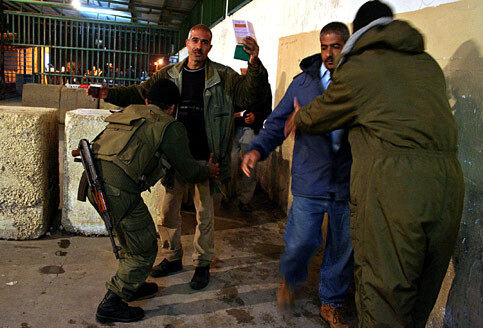Gaza Strip, Palestine 26 February 2007

Labourers are searched by Palestinian security force officers as they cross from the Palestinian side of the Erez crossing, between the northern Gaza Strip and Israel, 12 December 2005. (MAANnews/Wesam Salem)
Leaving Gaza requires one to walk through a long tunnel made up of turnstiles, X-ray machines, gates, cages and passport controls. This past Wednesday I found the tunnel ending abruptly ahead of me, a crudely fashioned wall barred me from the usual way of entry — instead, an opening to the right lead to an unknown place. I turned the corner and found myself in an Orwellian passage leading to a huge building with four automatic doors that were shut tight. Along this fenced-in passageway runs an anachronistic, medieval ditch, beyond it a mound made of rubble and dirt of the once magnificently fruitful region of Beit Hanoun. Today, much of the town lies in disrepair and its surrounding land remains green but empty of the life that once grew there. The caged passages are adorned with security cameras and buzzing speakers reminding every passerby that yes, someone somewhere is watching. Along the way I met a Palestinian businessman who owns a clothing factory in Gaza. Mohamed had a bad back. He was leaning against the fence and breathing heavily. I asked if he needed any help and walked next to him slowly, when suddenly he took a hold of my hand, making use of the extra support; we had about 300 meters left to go.
At the sliding gates that opened to a yet unknown world to us stood nine other such businessmen. I noticed one of them looking around for a video camera to ascertain if we had been spotted waiting there. An odious sign informed the travelers that bags would be searched. The sign apologized in advance for any inconvenience. In big letters it then read, “no weapons allowed”. Security, it seemed to imply, was the purpose for this special experience.
Suddenly, a door slid open and the ten businessmen, including Mohamed with the bad back, and I entered the looming building before it slid shut again. Once inside the true Orwellian experience began. We were faced by the first metal detector and turnstile; the latter would only allow one through if the metal detector did not distinguish any metal items in one’s belongings. My bag caused the alarm to sound and three unfortunate businessmen were restrained from entering along with me. What followed was a procedure to negotiate our release by one of the businessmen speaking Hebrew through an intercom with an out of sight Israeli soldier or police officer, while then translating instructions back to me. After having moved back 20 meters, opening my belongings in sight of one of the security cameras, the automatic lock was released and we were given permission to enter. This was only the beginning.
After walking up a ramp and around a bend we entered a building much like a warehouse, yet I sensed something otherworldly there. Again a turnstile prevented about 40 people gathered there to proceed to the next unknown stage. It would take me over an hour to achieve this feat. A Palestinian (no Israelis were in sight) handed out stickers with numbers on them, one for each traveler and an equivalent number for each bag. Next, everything but the clothes on my body, minus the belt, minus everything in my pockets, electronic items separate, were placed on a conveyor belt and disappeared, while I waited in line to enter yet another metal detector, then a curious X-Ray machine and a further stall with a locked door on either side, much like a cow in a pen, as to give the unseen officers full control over my entering and exiting. Having crossed this obstacle there was another conveyor belt, which eventually spit out the luggage on huge trays with the content of the bags spread about in disarray. When I saw my tray approaching I had to fight my way through the crowds, ascertained all my valuables were included and started dressing. Looking up I noticed a large surveillance room with women and men of various ages scanning computer screens and the people below. I felt small and powerless, a member of a different world than the one above.
After passing through yet another turnstile I spent over half an hour waiting for one of the passport control officers to appear to verify my papers. Here I met Piedro. I had noticed him early on, looking frustrated in the midst of the crowd of Palestinian businessmen and next to a pale, old man wearing a ski cap, who was slowly fingering his luggage and then finally located his pouch of medication filled with an assortment of pills. I later learned that Piedro had never made it into Israel that day.
The Erez terminal is now considered an international border, yet I wonder what it is that I am entering when I cross from Israel to this non-entity. A now comatose Ariel Sharon not too long ago declared to have ended Israeli “control over and responsibility” for this no-mans-land, yet this barely seems to be the case.
The world’s memory seems exceedingly short. Yet, this nightmare for the few Palestinians who are permitted to cross here, is a disturbing, reoccurring one.
Philip Rizk is an Egyptian-German who has lived in Gaza since August 2004 where he works and writes. Philip runs a blog: tabulagaza.blogspot.com




